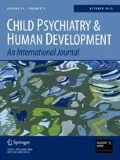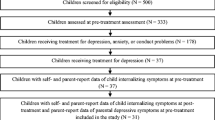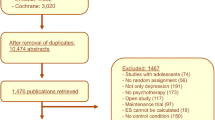Abstract
This study reports on 122 families with a depressed parent at baseline and matched nondepressed control families. The 10-year course of depression in parents was characterized as stably-, partially-, or non-remitted. At the 10-year follow-up, children of stably-remitted parents had more psychological distress, physical problems, and disturbance than children of controls. Unexpectedly, children of stably-remitted parents had as much distress and disturbance as children of partially- or non-remitted parents. Stably-remitted families emphasized independence less, and organization more, in comparison to controls at 10 years; partially- and non-remitted families were less cohesive and more conflicted than controls. More severe initial or current parental depression was associated with poorer child adaptation, and family functioning explained children's outcomes above and beyond parents' depression. Children living with parents treated for depression are at risk for problems irrespective of the parent's course, perhaps due to poor family functioning.
Similar content being viewed by others
References
Cummings EM, Davies PT: Maternal depression and child development. J Child Psychol Psychiat 35:73-112, 1994.
Downey G, Coyne JC: Children of depressed parents: An integrative review. Psychol Bull 108:50-76, 1990.
Goodman SH, Gotlib IH: Risk for psychopathology in the children of depressed mothers: A developmental model for understanding mechanisms of transmission. Psychol Rev 106:458-490, 1999.
Weissman MM, Warner V, Wickramaratne P, Moreau D, Olfson M: Offspring of depressed parents: 10 years later. Arch Gen Psychiatry 54:932-940, 1997.
Ghodsian M, Zajicek E, Wolkind S: A longitudinal study of maternal depression and child behaviour problems. J Child Psychol Psychiatr 25:91-109, 1984.
Wolkind S, Coleman EZ, Ghodsian M: Continuities in maternal depression. Int J Fam Psychiatr 1:167-182, 1980.
Cogill SR, Caplan HL, Alexandra H, Robson KM, Kumar R: Impact of maternal postnatal depression on cognitive development of young children. Br Med J 292: 1165-1167, 1986.
Cox AD, Puckering C, Pound A, Mills M: The impact of maternal depression in young children. J Child Psychol Psychiatr 28:917-928, 1987.
Alpern L, Lyons-Ruth K: Preschool children at social risk: Chronicity and timing of maternal depressive symptoms and child behavior problems at school and at home. Dev Psychopathol 5:371-387, 1993.
Lee CM, Gotlib IH: Adjustment of children of depressed mothers: A 10-month follow-up. J Abnorm Psychol 100:473-477, 1991.
Conger RD, Patterson GR, Ge X: It takes two to replicate: A mediational model for the impact of parents' stress on adolescent adjustment. Child Dev 66:80-97, 1995.
Harnish JD, Dodge KA, Valente E: Mother-child interaction quality as a partial mediator of the roles of maternal depressive symptomatology and socioeconomic status in the development of child behavior problems. Child Dev 66:739-753, 1995.
Weissman MM, Paykel ES: The Depressed Woman: A Study of Social Relationships. Chicago: University of Chicago Press, 1974.
Moos RH, Cronkite RC, Moos BS: Family and extrafamily resources and the 10-year course of treated depression. J Abnorm Psychol 107:450-460, 1998a.
Moos RH, Cronkite RC, Moos, BS: The long-term interplay between family and extrafamily resources and depression. J Fam Psychol 12:326-343, 1998b.
Fendrich M, Warner V, Weissman MM: Family risk factors, parental depression, and psychopathology in offspring. Dev Psychol 26:40-50, 1990.
Johnson VK, Cowan CP: Children's classroom behavior: The unique contribution of family organization. J Fam Psychol 13:355-371, 1999.
Billings AG, Moos RH: Comparisons of children of depressed and nondepressed parents: A social-environmental perspective. J Abnorm Child Psychol 11:463-485, 1983.
Billings AG, Moos RH: Children of parents with unipolar depression: A controlled one-year follow-up. J Abnorm Child Psychol 14:149-166, 1986.
Cronkite RC, Moos RH, Twohey J, Cohen C, Swindle R: Life context, personal resources, coping, and the ten-year course of depression. Am J Community Psychol 26:25-280, 1998.
Moos RH, Cronkite RC: Symptom-based predictors of a ten-year chronic course of treated depression. J Nerv Ment Dis 187:360-368, 1999.
Spitzer RL, Endicott J, Robins E: Research diagnostic criteria: Rationale and reliability. Arch Gen Psychiatry 35:773-782, 1978.
Billings AG, Cronkite RC, Moos RH: Social-environmental factors in unipolar depression: Comparisons of depressed patients and non-depressed controls. J Abnorm Psychol 92:119-133, 1983.
Billings AG, Moos RH: Treatment experiences of adults with unipolar depression: The influence of patient and life context factors. J Consult Clin Psychol 52:119-131, 1984.
American Psychiatric Association: Diagnostic and Statistical Manual of Mental Disorders: Fourth Edition. Washington, DC: American Psychiatric Association, 1994.
Stevens G, Featherman DL: A revised socioeconomic index of occupational status. Soc Sci Res 10:364-395, 1981.
Moos RH, Cronkite RC, Finney JW: Health and Daily Living Form Manual: Second Edition. Palo Alto, CA: Mind Garden, 1990.
Moos RH, Moos BS: Family Environment Scale Manual: Third Edition. Palo Alto, CA: Consulting Psychologists Press, 1994.
Beardslee WR, Salt P, Porterfield K, Rothberg PC, van de Velde P, Swatling S, Hoke L, Moilanen DL, Wheelock I: Comparison of preventive interventions for families with parental affective disorder. J Am Acad Child Adolescent Psychiatr 32: 254-263, 1993.
Duncan TE, Duncan SC, Hops H: The effects of family cohesiveness and peer encouragement on the development of adolescent alcohol use: A cohort-sequential approach to the analysis of longitudinal data. J Stud Alcohol 55:588-599, 1994.
Beardslee WR, Podorefsky D: Resilient adolescents whose parents have serious affective and other psychiatric disorders: Importance of self-understanding and relationships. Am J Psychiat 145:63-69, 1988.
Eccles JS, Flanagan C, Lord S, Midgley C, Roeser R, Yee D: Schools, families, and early adolescents: What are we doing wrong and what can we do instead? J Dev Behav Pediatr 17: 267-276, 1996.
Goodman SH, Brumley HE: Schizophrenic and depressed mothers: Relational deficits in parenting. Dev Psychol 26:31-39, 1990.
Beardslee WR, Versage EM, Wright EJ, Salt P, Rothberg PC, Drezner K, Gladstone, TRG: Examination of preventive interventions for families with depression: Evidence of change. Dev Psychopathol 9:109-130, 1997.
Tarullo LB, DeMulder EK, Martinez PE, Radke-Yarrow M: Dialogues with preadolescents and adolescents: Mother-child interaction patterns in affectively ill and well dyads. J Abnorm Child Psychol 22:33-51, 1994.
Gelfand DM, Teti DM: The effects of maternal depression on children. Clin Psychol Rev 10: 329-353, 1990.
Hops H: Age-and gender-specific effects of parental depression: A commentary. Dev Psychol 31:428-431, 1995.
Tarullo LB, DeMulder EK, Ronsaville DS, Brown E, Radke-Yarrow M: Maternal depression and maternal treatment of siblings as predictors of child psychopathology. Dev Psychol 31:395-405, 1995.
Radke-Yarrow M, Zahn-Waxler C, Richardson DT, Susman A, Martinez P: Caring behavior in children of clinically depressed and well mothers. Child Dev 65:1405-1414, 1994.
Weissman MM: The depressed mother and her rebellious adolescent. In Children of Depressed Parents: Risk, Identification, and Intervention., ed. Morrison, HL.: New York: Grune & Stratton, 1983.
Stein A, Gath DH, Bucher J, Bond A, Cooper PJ: The relationship between postnatal depression and mother-child interaction. Br J Psychiatry 158:46-52, 1991.
Sheeber L, Sorensen E: Family relationships of depressed adolescents: A multimethod assessment. J Clin Child Psychol 27:268-277, 1998.
Andrews JA, Hops H, Ary D, Lichtenstein E, Tildesley E: The construction, validation, and use of a Guttman scale of adolescent substance use: An investigation of family relationships. J Drug Issues 21:557-572, 1991.
Friedman AS, Tomko LA, Utada A: Client and family characteristics that predict better family therapy outcome for adolescent drug abusers. Fam Dynamics Addict Q 1:77-93, 1991.
Moos RH, Billings AG: Children of alcoholics during the recovery process: Alcoholic and matched control families. Addict Behav 7:155-163, 1982.
Buchanan CM, Maccoby EE, Dornbusch SM: Caught between parents: Adolescents' experience in divorced homes. Child Dev 62:1008-1029, 1991.
Keller MB, Beardslee WR, Dorer DJ, Lavori PW, Samuelson H, Klerman GR: Impact of severity and chronicity of parental affective illness on adaptive functioning and psychopathology in children. Arch Gen Psychiatry 43:930-937, 1986.
Fergusson DM, Lynskey MT, Horwood LJ: The effect of maternal depression on maternal ratings of child behavior. J Abnorm Child Psychol 21:245-269, 1993.
Richters JE: Depressed mothers as informants about their children: A critical review of the evidence of distortion. Psychol Bull 112:485-499, 1992.
Richters JE, Pellegrini D: Depressed mothers' judgments about their children: An examination of the depression-distortion hypothesis. Child Dev 60:1068-1075, 1989.
Hedlund S, Rude SS: Evidence of latent depressive schemas in formerly depressed individuals. J Abnorm Psychol 104:517-525, 1995.
Cui XJ, Vaillant GE: Does depression generate negative life events? J Nerv Ment Dis 185: 145-150, 1997.
Sheppard LC, Teasdale JD: Depressive thinking: Changes in schematic mental models of self and world. Psychol Med 26:1043-1051, 1996.
Gotlib IH, Goodman SH: Children of parents with depression. In Developmental Issues in the Clinical Treatment of Children, eds. Silverman, WK, Ollendick, TH: Needham Heights, MA: Allyn & Bacon, 1999.
Daniels JA: Adolescent separation-individuation and family transitions. Adolescence 25:105-116, 1990.
Author information
Authors and Affiliations
Rights and permissions
About this article
Cite this article
Timko, C., Cronkite, R.C., Berg, E.A. et al. Children of Parents with Unipolar Depression: A Comparison of Stably Remitted, Partially Remitted, and Nonremitted Parents and Nondepressed Controls. Child Psychiatry Hum Dev 32, 165–185 (2002). https://doi.org/10.1023/A:1017924421229
Issue Date:
DOI: https://doi.org/10.1023/A:1017924421229




